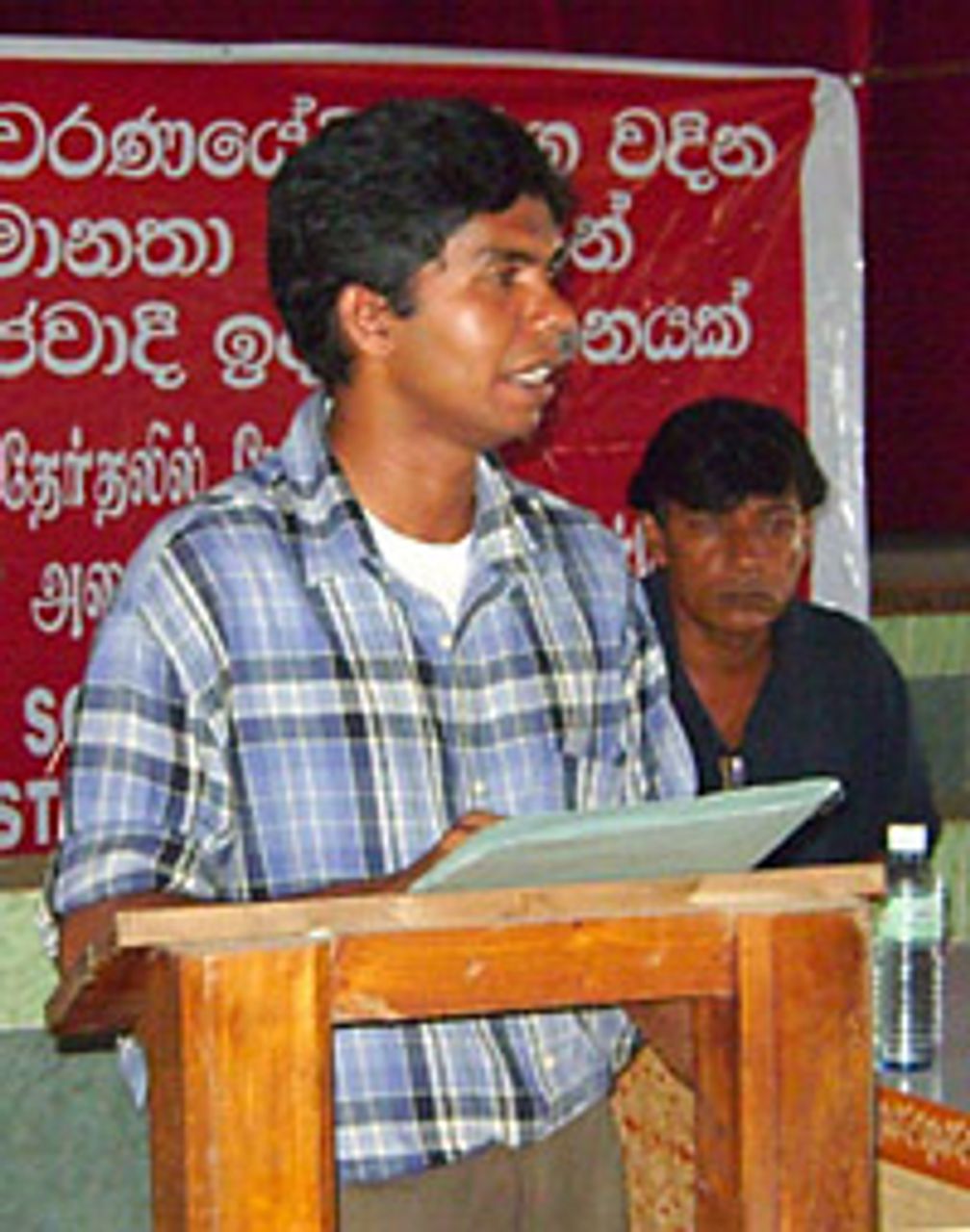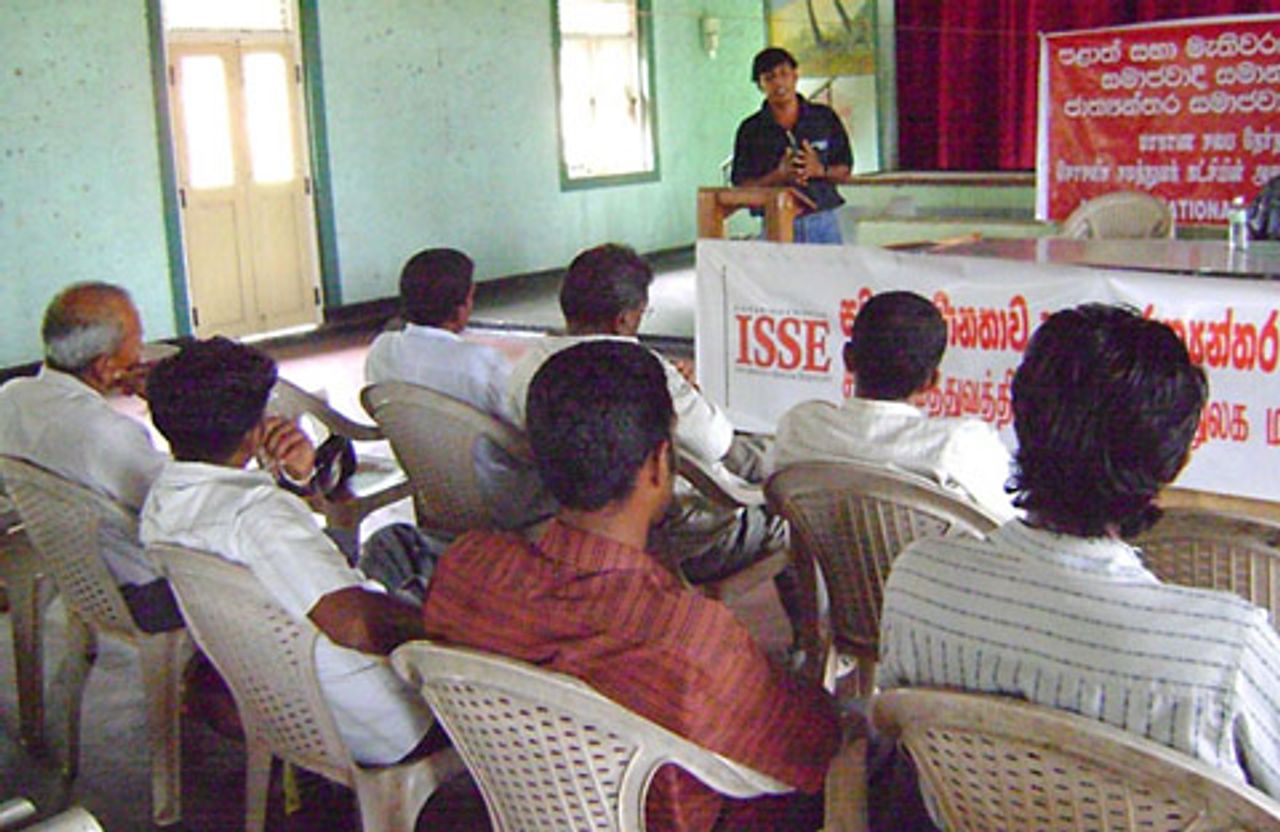The Socialist Equality Party (SEP) in Sri Lanka held a public meeting at the Town Hall, Puttalam on January 26 as part of its campaign for the February 14 Provincial Council elections. The SEP is fielding 19 candidates in the Puttalam district of Northwestern province and another 19 in the Nuwara Eliya district of Central province.
People from all the country's major ethnic backgrounds—Sinhala, Tamil and Muslim—are among the population of more than 700,000 living in Puttalam, which is about 130 km to the north of Colombo. They include tens of thousands of refugees, mostly Muslims who fled from the Jaffna Peninsula and the eastern province during the island's 25-year civil war.
Many people living along the north-western coastal line are traditionally engaged in fishing and are very poor. They are facing severe difficulties due to restrictions imposed by the navy as part of the war.
Before the meeting, SEP members and supporters campaigned for several days, distributing about 4,000 copies of the SEP statement, "Sri Lankan SEP stands in provincial elections to oppose war and attacks on democratic rights". Local people often expressed disinterest in the elections, criticising the main parties and saying the elections would not improve their lives.
At a Tamil school, students and teachers asked SEP campaigners whether the war would end soon and if peace would return to their lives. Many Muslims expressed concern over government repression in the East since the military captured areas held by the separatist Liberation Tigers of Tamil Eelam (LTTE).
A large cement factory in Puttalam was privatised two decades ago, retrenching hundreds of workers. Security guards refused to allow SEP campaigners into the workers' quarters to discuss the party's policies.
 SEP candidate Kapila Fernando
SEP candidate Kapila FernandoWorkers, fishermen, students, youth and small traders attended the town hall meeting. Kapila Fernando, one of the SEP's candidates and Sri Lankan convener of the International Students for Social Equality (ISSE), chaired the meeting.
Fernando told audience that the SEP campaign was focussed on the unfolding crisis of the world capitalist economy and the political issues raised by the Sri Lankan war. As the recession deepened in the US and other developed countries, hundreds of thousands of people had lost their jobs.
Fernando commented: "The new US president, Barack Obama, has stated that this crisis is due to a failure of all. In other words, he maintains that the working class and the oppressed must bear the burden. But this is a crisis of US and world capitalism."
Turning to Sri Lanka, he said: "In this country, most young people have been born and lived under the horrors of war and repression, particularly since 1983. Unemployment is rampant. Thousands of Tamil and Sinhala youth are perishing in the North and East due to the war resumed by President Mahinda Rajapakse.
"Young men are reluctantly joining the military as they have no other hope for a job. They are sent to the war and thousands have been killed. Tens of thousands of young people cannot enter the universities even after they pass the relevant exams."
Fernando invited the young people present to join the ISSE to take up the struggle against social inequality and fight for socialism in Sri Lanka and internationally.
Nihal Geekiyanage, who heads the SEP candidate list in the district, said the ruling alliance had unleashed violence, deploying thugs to intimidate voters. "This is not accidental. The government cannot solve the social problems of the poor. People are hostile to all the political parties. So the governing party is seeking to intimidate people and grab votes.
 Nihal Geekiyanage addressing the meeting
Nihal Geekiyanage addressing the meeting
"The SEP is the only party in this election taking a stand against the war, based on an independent program for the working class. Our party opposed the war from its beginning in 1983. It is a war of the ruling class, which President Mahinda Rajapakse resumed a few months after he came to power. It is the government's weapon to oppress Tamils and divide the working class."
Geekiyanage explained that the war was supported by US imperialism, India and other powers. Just after the military captured Killinochchi, the LTTE's de facto capital, the US embassy in Colombo issued a statement declaring that it did "not advocate negotiations with the LTTE". Having obtained this public backing, the government immediately banned the LTTE.
The speaker warned that the ban could be applied to outlaw any political opponents of the government, and to detain workers and youth. Geekiyanage pointed to the government's record of threatening workers when they demanded higher wages, accusing them of endangering "national security".
Geekiyanage addressed the role of the Sri Lanka Muslim Congress (SLMC), explaining that it was based on Muslim communalism. The SLMC claimed to represent Muslim people in the district but it represented the interests of a section of the Muslim elite. The organisation's politics mirrored the Sinhala ruling elite's use of chauvinism to divide the working class. The SLMC had joined various Sri Lankan governments and facilitated the war.
Geekiyanage urged working people not to support political parties and groups based on communalism, be it Sinhala, Tamil or Islam. Instead, workers had to unite across ethnic lines to build an independent political movement of the working class based on socialist internationalism.
SEP political committee member and Nuwara Eliya district candidate Panini Wijesiriwardane emphasised the necessity for working people to study the lessons of history. "If there was a time machine that enabled people to travel into the past, they would definitely find parallels to the present situation in the late 1920s and 1930s. We have no such time machine, but we must base ourselves on the historical experience and lessons acquired by the Trotskyist movement."
In 1930s the major powers entered the Second World War, which brought destruction to millions of human lives and productive forces. Today every sector of capitalist economic life—the banks, financial institutions, credit systems and share markets—was collapsing. This breakdown was laying the basis for social upheavals involving millions of people.
Wijesiriwardane noted the deepening Sri Lankan financial crisis, observing that the country's treasury had foreign reserves to cover only six weeks of imports. Desperate to attract foreign exchange, the Central Bank had decided to sell treasury bills among Sri Lankans abroad, a campaign that included arranging concerts to sing patriotic songs.
Huge war expenditures and the international downturn had intensified the economic problems of the government, which had responded by branding workers who demanded wage rises as allies of the LTTE. "Last year alone, war spending consumed 20 percent of government expenditure. When teachers called for badly-needed pay increases, President Rajapakse asked: ‘Do you want me to withdraw the army from the north?' He gave the same reply to other workers too."
Wijesiriwardane pointed out that President Rajapakse had made a long list of promises to resolve the problems of tea plantation workers at a meeting in Norwood on January 25. The length of the list only showed that not a single pressing problem had been solved by successive governments, including his own, during the 61 years since independence.
The trade unions had adapted to the government threats and betrayed workers' struggles, Wijesiriwardane explained. Without opposing the war, workers could not defend even their most basic needs. Without breaking from these organisations and building its own revolutionary party, the working class could not defend its rights.
The speaker outlined the SEP's perspective and program for a workers' and peasants' government and a Sri Lanka-Eelam Socialist Republic as part of a Union of Socialist Republics in South Asia. "We demand the unconditional withdrawal of the Sri Lankan military from the north and east," he said. "That is the first step to stopping the war and uniting Sinhala, Tamil and Muslim workers against the government. At the same time, we give no support to the LTTE's separatist perspective, which serves only to divide workers along ethnic lines."
Wijesiriwardane noted that many workers, youth and housewives had told SEP campaigners that they were burdened with soaring prices and poverty. Stopping the war was one immediate necessity, he said. That task was bound up with reorganising the entire economy on socialist lines, abolishing the private profit system, nationalising the big companies and financial houses under democratic control, and directing production to meet human needs. This was part of the fight for an international socialist perspective, Wijesiriwardane emphasised.
After the meeting, a Muslim youth, Hussain, who was forced to come to Puttalam as a three-year-old child from Jaffna in 1990, spoke about his experience. The LTTE had ordered Muslims to leave Jaffna, falsely claiming that they supported the government's war. Those displaced were still living in refugee camps, he said.
"I have spent 18 years here since being expelled and still live as a displaced person. We live in huts. No governments or other parties will give us a hand."
Hussain had sought help from the Sri Lanka Muslim Congress but without any result. "Today I decided to join this party [the SEP]," he said. "We have a group organised for peoples' rights in my area, and I would like to organise an SEP discussion with others in the group."
